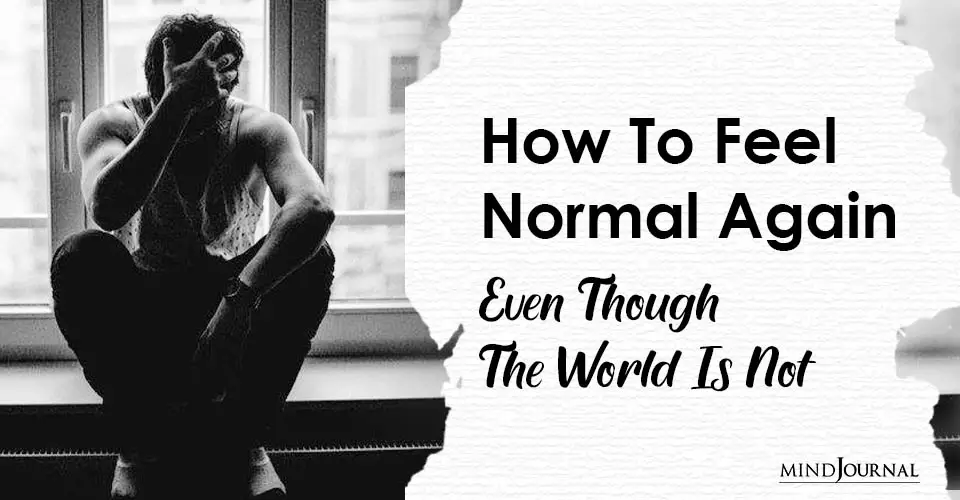With the world still fighting the dreaded pandemic, everyone wants to feel normal again. Everyone wants some semblance of normalcy back in their lives.
It’s hard to throw around the word “normal” these days. Humans– we love our routines, our holiday or weekend traditions, and all of those mindless behaviors that give us comfort. Let’s face it, though; 2020 has thrown the most massive wrench in all of our plans, and it’s time to consider that things may never be the same.
I’ve found myself using the phrase “the new normal” a lot, lately. My husband still has to remind me to put my mask on before getting out of the car in the grocery store parking lot, and I often respond with, “Oh yeah… the new normal,” and although most states have (picture giant air quotes here) opened back up, we want to avoid having COVID-19 return with a vengeance.
As with anything else in the United States of Opinions, everyone feels differently about how life should look, but I think we can all agree that we desperately need some semblance of familiarity and, well — normalcy.
Here Are A Few Things We Can Do To Feel A Little More Normal, Even If The World Is Not
1. Get Some Sleep
In the first few months of the pandemic, I could count on one hand the nights I got a decent 8 hours of sleep. Working from home, I’m already not the most disciplined when it comes to the whole “early to bed, early to rise” stuff, but in March and April, it seemed like the whole world was awake at all hours with me.
I became desperate for those quiet moments in the dead of night when emails and Slack weren’t pinging, social media wasn’t screaming political and sociological ideals, and anyone and anything with loud opinions and bad news were asleep.
Proper sleep hygiene not only feels good, but it also improves your mood and productivity levels and helps keep your immune system stronger and less vulnerable. Do you remember the 2019 chatter about self-care? Sleep should definitely be on that checklist, and probably further up than your iced coffee or expensive moisturizer.
Related: 8 Things You Can Do To Take Care Of Your Mental Health During Social Distancing
2. Equip Yourself With Emotional PPE
A few weeks ago during one conversation with my own therapist, I mentioned that he and his colleagues (meaning other mental health professionals) would essentially become the frontlines during the Reconstruction following the war against COVID-19.
Not only have many of us been under lockdown and in isolation, but even more of us have also experienced literal tragedies in the face of this virus — some physical, some emotional, and some financial.
We’re facing an overwhelming amount of instability and that leads us to feel extremely insecure. Tragedies are traumatic events that increase stress, anxiety, substance misuse, and other post-traumatic stress disorder symptoms, and although these can’t be remedied overnight, I’m hearing more and more platforms speaking up about emotional PPE.
Building Resilience
There is so much going on right now that is new, unfamiliar, and uncomfortable, and I know there have been times where I’ve just wanted to curl up and cry. Just this morning, I noticed that we were out of milk, and when I realized I’d have to throw on my mask and mentally prepare myself for a socially distant trip to the grocery store — even a brief one — I yelled into my bedroom: “WHY is this not OVER YET!?” I recognize that this was a total brat moment, but you see what I mean — this constant feeling of potential infection, danger, or disaster causes so. much. tension, and when tension and other negative emotions get out of control, you start to cause damage to yourself, your life, and your relationships.
Stress management, mindfulness, and self-compassion are some individual and institutional skills we can develop to help us build resilience against the trauma this pandemic is causing many of us. These skills can also help us build better habits and healthier coping mechanisms, and once ingrained, make your day-to-day feel calmer.
Related: 4 Strategies That Will Make Coping With Coronavirus Stress Easier
3. Make and Keep Your Appointments
Our routines have been disrupted enough in all of this: some of us are working from home, our social gatherings have been canceled — even our grocery trips have changed.
A lack of structure or schedule paired with total uncertainty can really affect your mental health, but losing our good habits or jeopardizing our health will only make things worse. Our doctors, dentists, dermatologists, and even hairstylists are limiting visits and taking extra precautions to ensure your health and safety, so it’s important to respect them and yourself by making and keeping your appointments.
We don’t know how long this thing is going to last, so keeping your six-month cleaning appointment with your hygienist or even your mammogram is not only important to your overall health, it also gives you a chance to safely leave the house, do something to take care of yourself, and interact with someone other than your dog.
4. Laugh
Yes — money is tight, your kids are driving you insane, and there are only so many reruns of NCIS you can watch, but the best (and my personal favorite) way to get your life back to normal right now? Laughter! As they say (whoever “they” are), “Laughter is the best medicine.”
It may seem cliche, but psychologists agree that humor helps us relieve stress, and right now it also helps us do two very important things: connect with other people and feel more in control in this powerless situation.
Don’t lie: you know you watched Tiger King when all of this began, and why? Because it was a hilarious train wreck.
Not only did I watch all of Tiger King in one sitting, but I’ve also spent many evenings forcing Mr. Holley to watch hours of TikTok videos (and maybe have even begged him to help me make one myself).
Laughter helps us lower our cortisol levels, a hormone related to stress, and strengthens our immune systems.
So, call up your best friend or your mom on Zoom or Facetime and retell the story of your cousin crapping his pants at Disney World.
Download TikTok and watch Stacey ask her husband dirty jokes; the jokes are pretty funny, but his reactions are golden.
You might even want to start your next Zoom meeting by asking everyone to share their favorite “Dad Joke,” so bad that you can’t help but laugh.
Related: Cabin Fever: 8 Ways To Cope With Feeling Stuck At Home
The world is more than a little weird right now, guys, it’s true, and sadly — it’s not going to go back to normal — at least, not the normal we’re used to. Make your mental health a priority, and find ways to accept the uncertainty. If nothing else seems to work — reach out to a friend or a professional. Their counsel (or jokes!) might be the key to getting your life back to normal (even if the world isn’t).


Leave a Reply
You must be logged in to post a comment.